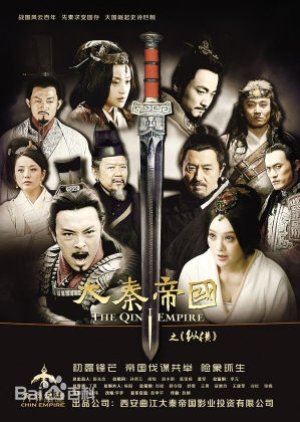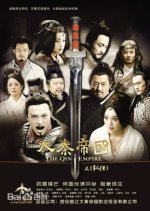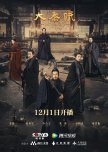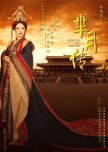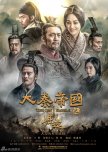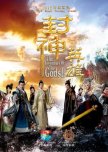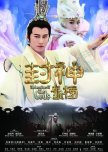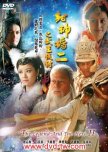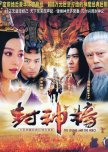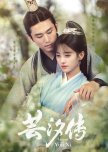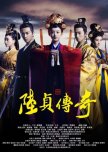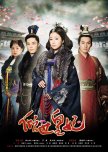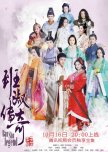 Talents Under Huanyu Film
Talents Under Huanyu Film It romanticizes the events in China during the Warring States period primarily from the perspective of the Qin state during the reigns of King Huiwen and King Wu. During the Warring States period, Qin state ruler Duke Xiao recruits statesman Shang Yang to help enact bold reforms that transform Western China. (Source: Wikipedia) ~~ Adapted from the novel "Qin Empire" by Sun Hao Hui. Edit Translation
- English
- Español
- Português (Brasil)
- 한국어
- Native Title: 大秦帝国之纵横
- Also Known As: The Qin Empire II: Alliance , Qin Empire Alliance , The Qin Empire 2 , Da Qin Di Guo Zhi Zong Heng
- Director: Ding Hei
- Genres: Historical
Where to Watch The Qin Empire Season 2
Free
Subscription (sub)
Cast & Credits
- Fu Da Long Main Role
- Yu En TaiZhang YiMain Role
- Liu Zhao HongYing JiMain Role
- Sun TingBai QiSupport Role
Reviews

I was actually rather taken back when I started, since this drama was noticeably lighter in lighting, atmosphere and acting compared to the first instalment, it took a little bit getting used to, although I think this made it much more accessible to wider audience. While its main focus is on Qin, there's fair amount of attention paid to other states too, since this was a time of diplomatic relationship, battles, betrayals and chaos. It can get rather difficult to follow for someone unfamiliar with the period, though I believe a quick runover of the various states' names/location should help a lot.
Our main protagonist Ying Si had a playful demeanour that masked his true feelings, cunning when it came to analysing situation and determining what's best for his country, manipulative and ruthless when he must do what's best, but he could also be affectionate towards his cousin, sincere towards his trusted adviser, reluctantly adoring to woman he loves. He also suffered a lot, lost his mother when he was young, grew up mostly with his uncle as his dad was too busy with the country, exiled as a teen, and had to sacrifice much more while on the throne during the span of this drama. Fu Dalong did an amazing job as him, I wasn't huge on his portrayal at first since it's a stark contrast to what I'm used to and expected, but he grew on me, and he played the various layers very very well.
There was very small amount of romance in this, although it's not the focus, they do help built up Ying Si and Zhang Yi's character and show us various women and the ways they could have lived back then. Mi Bazi (Consort Mi? idk) was daughter of an exiled noble, willingly entered a political alliance marriage, despite the fact she already had a child with a man she loved. Ying Si and her started with lust but end up with love and companionship, she lacked manners and could be rather blunt and open, knew what she wanted and rather determined on her goals. It was a pretty unusual relationship and characterisation, but rather true to history. She was the first Empress Dowager, in de facto power for 40 (?) years while her son was on the throne, till she dies, she really should be no less famous than Empress Dowager Cixi. I really disliked her makeup but I guess it's suppose to show she's young and clueless? Ning Jing seems to have pushed a little too hard when she first appeared, but she got better later.
Wei Shu was comparatively much more standard, tied to men around her, well mannered and educated. I did like the helpful inn owner Zi Xuan and smart and brave Ji Hu though, even if I'm not huge on their character trajectory. Overall, the major supporting characters were pretty varied, and fair amount of them were layered, which is very hard to do with such a large cast. The back and forth scheming between Zhang Yi and Gongsun Yan were very engaging, and had been enlightening watch. I think someone more familiar with the period would have a field day with this, I've definitely recognised some names, and was kind of disappointed we haven't got to their spotlight time.
The costumes were comparatively plain compared to today's dramas, but it was filmed 8 years ago and this was set 2000 years ago in a country that was rather poor, constantly battling and preferred more subdue style. Note that other states' clothes were bit fancier than Qin's. Unfortunately, the battle scenes weren't as good as the first entry, though they were pretty okay in general IMO, maybe it's just because I don't care about battles. Most of the drama was recorded live, but there was some VERY NOTICEABLE dubbed lines by super minor supporting character, and it was all by one person and not tuned at all, so it was hilariously jarring. There was also a couple scene (one very major one) that have people noticeably CG'ed in, please adjust the lighting properly!!
I actually think this is the best entry for international audience, since it doesn't just focus on Qin but also other states, the characterisations are't black and white and sometimes even refreshingly different, the story is engaging with enough history sprinkled in that you want to learn more about the period afterwards! Please give it a try!
Was this review helpful to you?

Divide and conquer.
Qin Empire 2 or Qin Alliance on Netflix is about Ying Si or King Huiwen of Qin who reigned from 338-311 BC. More than a century later, Ying Zheng or Qin Shihuangdi succeeded in unifying the Warring States(221 BC). In an interesting parallel, Ying Si was the first of the Dukes of Qin to name himself 王/Wang or King. His more well known descendent subsequently declared himself 皇帝/Huangdi or Emperor. I watched this out of order after completing Qin Dynasty Epic, which is Ying Zheng's story and the final installation of this four part series that doesn't have to be watched in order. This review is going to be short as there is an excellent comprehensive review by @Skibbies. I will try to avoid repetition and focus on incremental observations, especially on how this differs from the final season.What is most striking is that Ying Si really had it hard. When he came into power at eighteen, his father's clan and advisors were not fully behind him. And the Qin state was not especially powerful and existed in imminent danger of being swallowed by one of the other Warring States. Survival, much less ascendency was by no means a foregone conclusion. But Ying Si was a true conqueror - cunning, shrewd and utterly ferocious. Fu Dalong's masterful performance captures the remarkable indomitable spirit of the character and the sheer enormity and necessity of the task in front of him. This makes Ying Zheng, though so much more renown in history, seem like a lesser conqueror by comparison. For by then, Qin was already a superpower where the outcome was already inevitable.
The best parts of this drama are about how with the aid of his advisor and lifelong friend Zhang Yi, Ying Si was able to prevent five states from forming an alliance against Qin. They did this by some brilliantly crafted divide and conquer strategies that involved trickery, diplomacy and outright brutal and bloody warfare. Even though I was moved by Ying Si's deep relationship with Zhang Yi, I detested all of the so called genius strategists in this show, including Zhang Yi. I just could not stand their arrogance and sense of intellectual snobbery and how vile and evil these turds of history were. Their loyalty is not to king and country but can be bought by whoever could give them the most chess pieces to play with with little respect for the sanctity of life. To them, war is just a giant chess board where they can showcase their talent to the world. In the end Ying Si prevailed over all of them not because Zhang Yi was smarter or more loyal but because for Ying Si it was a battle for survival won by blood and sacrifice. His army would have gone to the ends of the earth for him because even while he took them to victory and glory, he truly felt the loss of and grieved for his fallen soldiers.
Even though I am sure it is heavily romanticized, I loved the portrayal of Ying Si's passionate and tempestuous relationship with the wild and wanton Empress Mi. What a woman! She lived life large, loved and hated and was at the end the bravest most loyal custodian of Ying Si's legacy. The drama lost momentum for me after Ying Si's death but the final two episodes where Empress Mi was both ruthless and compassionate at the same time ends this on a strong note.
While this production looks dated and lacks the aesthetic and cinematic appeal compared to more recent historical dramas, the acting of the main characters is top notch. The telling of the story overall, especially in the art of war is well done, not overly complex or difficult to follow. I could have done without knowing so much about Zhang Yi's personal life but there were some decent moments. This an 8.5 for me largely because I cannot praise enough how Fu Dalong's Ying Si is unforgettable and everything a Qin conqueror should be.
Was this review helpful to you?

